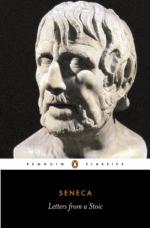
|
| Name: _________________________ | Period: ___________________ |
This test consists of 5 multiple choice questions, 5 short answer questions, and 10 short essay questions.
Multiple Choice Questions
1. Who says there are four causes?
(a) Seneca.
(b) Aristotle.
(c) Plato.
(d) Sophocles.
2. What is a syllogism?
(a) Two words that sound alike but have different meanings.
(b) A word or phrase with repetitive consonants.
(c) A form of deductive reasoning/logic.
(d) Two words with the same number of syllables and same meanings.
3. What creates certain habits of study and thought which are actually useful?
(a) Liberal arts.
(b) Sciences.
(c) Fine arts.
(d) Business studies.
4. In his example of suffering for the sake of knowledge, who does Seneca say was executed for blasphemy?
(a) Claudius.
(b) Homer.
(c) Plato.
(d) Socrates.
5. Why does Seneca praise suicide?
(a) He is tired of being sick.
(b) To cut back on medical needs of the community.
(c) It is active, not passive.
(d) He likes to challenge the legal system.
Short Answer Questions
1. According to Posidinus, who ruled in the past time?
2. According to his criticism in Letter CVIII, what does Seneca say literary scholars should do with philosophical theories?
3. Who says there are five causes?
4. What is symptomatic of excessive attachment to the body, according to Seneca?
5. According to Seneca, what was the goal of technological inventions of the past age?
Short Essay Questions
1. According to Seneca, what destroyed man's harmonic relationship with nature and what was the result?
2. How does Seneca feel about moving to improve studies?
3. Which city burned and how did it affect Seneca?
4. Why does Seneca say the Stoic account of causation is better than both Aristotle's and Plato's?
5. What lesson can be learned from the city that burned?
6. What is the value of a liberal arts education, according to Seneca?
7. What does Seneca say causes envy and how can envy be avoided?
8. Why does Seneca object to Posidinus' claims that philosopher's ruled during the Golden Age and were responsible for many new technological innovations?
9. What is the concept of causation according to Aristotle?
10. What is the Stoic concept of causation?
|
This section contains 873 words (approx. 3 pages at 300 words per page) |

|




